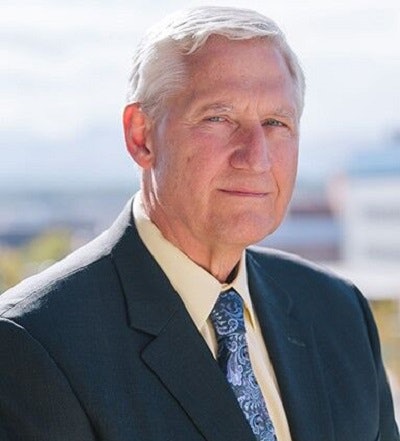Since his arrival at the University of Colorado Denver, Dr. David Engelke has been laser-focused on training graduate students to become the next generation of researchers and professors within academe.
 Dr. David Engelke
Dr. David Engelke“For 20 years, I’ve become increasingly involved in creating and improving Ph.D., master’s and certificate graduate programs across campus,” says Engelke, who became Graduate School dean in 2015 after serving in a number of administrative roles at the University of Michigan. “The position offered a chance to work with faculty and students to find creative solutions for opportunities and challenges.”
Engelke’s role as dean has largely been influenced by his own graduate school experience.
“My graduate and postdoctoral training were terrific for teaching me how to plan and conduct research,” says Engelke. “However, at that time, programs were not aimed at imparting some of the teaching, financial and personnel management skills academics need to be successful faculty members from the start, let alone serve in administrative roles. We eventually learn this through mentorship by more senior faculty, but it limits a person’s effectiveness in their early career.”
On Engelke’s watch, the university has aggressively courted and retained students of color, preparing them for a variety of careers in industry as well as academe.
“The reasons for pursuing graduate training are incredibly diverse, ranging from personal enrichment to career advancement, either in the private sector or academe,” says Engelke. “Even in a single program, students frequently have quite different motivations and aspirations, and these can evolve over the course of study. The challenge for the graduate programs is to design their training to be highly effective for these diverse needs.”
Officials at CU Denver say that they have been intentional about boosting their underrepresented student populations. With Engelke’s support, they have focused their attention on creating new academic programs centered on access, equity and social justice.
Last year, Dr. Linda Bowman spearheaded the launch of a new doctoral program called Leadership for Educational Equity. The three-year, cohort-based program provides a hybrid online and on-campus format that focuses on empowering leaders in higher education to improve educational access, equity and success in diverse urban and rural communities.
“The time is right for this program, and CU Denver is the right place for it,” says Bowman, who served for 13 years as president of Colorado Community College before joining the faculty in CU Denver’s School of Education & Human Development. She is now CU Denver’s interim vice provost and senior vice chancellor for student access and achievement. “We have the commitment of faculty and administration to shape the future of leadership in higher education with an equity-mindedness that will serve the students of the future.”
 Dr. Linda Bowman
Dr. Linda BowmanThe first student cohort of 17 students from diverse backgrounds started their coursework this summer, taking a variety of courses ranging from law and ethics, organizational cultures, finance and strategic resource allocation to predictive analytics.
According to Bowman, the program also offers executive coaching for graduates once they complete the program.
“As leaders are moving up in responsibility, the role of coaching is critical to their success,” says Bowman. “I have provided this service, and I know that having someone who understands your work and can provide you safe and confidential feedback can help you navigate the challenges of each new day in your career.”
The doctoral program is targeting individuals already in the higher education space with hopes of preparing them to become a university dean, provost or president. This will inevitably fill a need with helping to diversify the administrative ranks of academe.
“For many years in higher education, we focused on access to get as many people into our institution as possible, but we didn’t necessarily utilize technology to make the kind of precise decisions needed to help students,” says Bowman. “We now have the opportunity to use data analytics to project how to best accommodate different populations.”
She adds: “If I am a student who goes back to school and, perhaps, I’m an older student, and I work, and I have family responsibilities, what are the kind of support systems we as an institution need to have available? Utilizing data to find things like this is really important.”
Bowman says that the program was created for working adults looking to advance in higher education.
“It’s designed so a working professional is able to be in this program because it utilizes online education,” says Bowman. “It’s offered one course at a time so you can focus on that course and be working and apply what you learn.”
She says that large-scale demographic changes in the United States, as well as the exodus of baby boomers from higher education, affirms the need for new and innovative programs like the Ed.D. in Leadership for Educational Equity.
“I feel very fortunate to have this opportunity to come into this institution, which I love anyway, and be part of this program, which I believe will really change opportunities for thousands of people — that’s a thrill,” says Bowman, who earned her Ph.D. from CU Denver in 1995. “I had a terrific experience as a student here. It was a turning point for me in terms of being able to rethink systems and strategies for student success.”
This article appeared in the Aug. 22 issue of Diverse.



















